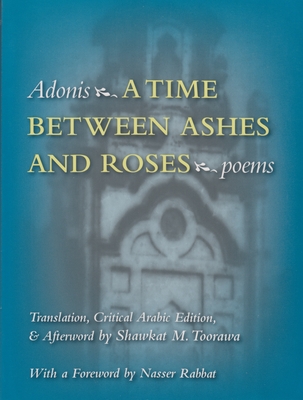



The Arab world's greatest living poet.--The New York Times
Adonis is one of the most important major literary figures of our century. His vision is extraordinary, his poetry sublime . . . a master of our times.--V. S. Naipaul
At first glance, Sufism and Surrealism appear to be as far removed from one another as is possible. Adonis, however, draws convincing parallels between the two, contesting that God, in the traditional sense, does not exist in Surrealism or in Sufism, and that both are engaged in parallel quests for the nature of the Absolute, through holy madness and the deregulation of the senses.
This is a remarkable investigation into the common threads of thought that run through seemingly polarised philosophies from East and West, written by a man Edward Said referred to as the most eloquent spokesman and explorer of Arab modernity.
Adonis is one of the most celebrated poets and essayists of the Arab world. Born in Syria in 1930, he fled political persecution and settled in Lebanon in the 1950s, where he led the modernist movement in Arabic poetry. He has written more than thirty books in Arabic, including the pioneering work An Introduction to Arab Poetics, and was awarded the Goethe Prize in 2011 for his contribution to international literature. His other awards include the Spiros Vergos Prize for Freedom of Expression, the Bj rnson Prize, the International Nâzim Hikmet Poetry Award, and the Syria-Lebanon Best Poet Award.

Adonis in the Pyrenees: another conversation in the mountains where a multiplicity of orients and occidents intermingle, where dialogue between Adonis, the major Arab-language poet at work today, and Pierre Joris, nomad poet between the United States, Europe, and North Africa, becomes polylogue, exchanging reflections that range from the destructive role all monotheisms play in history -- in relation to woman, but also to the power structures throughout cultures -- to questions of poetics and the possible role of the spiritual in contemporary poethics. These conversations -- under the general title Religion is an answer, poetry a question -- took place in June in the small village of Germ-Louron in the French Pyrenees in the context of Les Porteurs de Mots /The Word-Carriers, an annual cultural festival organized by Franck Morini re. These conversations were framed by a range of events, musical & theatrical performances, poetry readings and talks.
Adonis dans les Pyr n es: autre conversation dans les montagnes o une multiplicit d'orients et d'occidents s'entrem lent, o un dialogue entre Adonis, le plus important po te de langage arabe au travail aujourd'hui, et Pierre Joris, po te nomade entre l'Europe, les Etats-Unis et le Maghreb, devient polylogue, change de r flexions allons du r le destructeur que jouent tous les monoth ismes dans l'histoire -- par rapport la femme, mais aussi aux structures de pouvoir de toutes les cultures -- des questions de po tiques et du r le possible d'une spiritualit dans la po thique contemporaine. Ces conversations -- sous le titre de La religion est une r ponse, la po sie une question -- eurent lieu en juin 2017 dans le petit village de Germ-Louron dans le Pyr n es dans le contexte d'un festival culturel annuel, Les Porteurs de Mots, organis par Franck Morini re. Conversations encadr es par un essaim d' v nements: performances musicales et th trales, lectures de po sie, et expos s.
This is a bilingual English/French edition.


Adonis's poetry and prose writings have aroused much controversy in the Arab world, both for their provocative content and their arresting style. Grounded in traditional poetic styles, Adonis developed a new way of expressing modern sentiments. Although influenced by classical poets, Adonis started at a relatively early age to experiment with the prose poem, giving it density, tension, metaphors, and rhythm. He also broke with the diction and style of traditional poems, introducing a new and powerful syntax and new imagery. Through his innovative use of language, imagery, and narrative technique, Adonis has played a leading role in the revolutionizing of Arabic literature. He has garnered many of the world's major poetry prizes.
In A Time Between Ashes and Roses Adonis evokes the wisdom of Whitman's Leaves of Grass, liberally excerpting from and remolding its images; the modernism of William Carlos Williams; and the haunting urban imagery of poets such as Baudelaire, Cavafy, and Lorca. Three long poems allow him to explore profoundly the human condition, by examining language and love, race and favor, faith and dogma, war and ruin. In the lyrical This Is My Name and Introduction to the History of the Petty Kings, Adonis ponders Arab defeat and defeatism. In A Grave for New York, he reflects on the same theme by interrogating Vietnam-era America. This bilingual edition, presenting the poems in Arabic and English on facing pages, is enhanced by a critical bibliography of Adonis's works, providing an accessible and crucial reference for scholars of modern and Middle Eastern poetry and culture. Shawkat M. Toorawa's vivid and eloquent translation finally makes the poet's signature work available to an English-speaking audience; the effect is no less powerful than were the first translations of Pablo Neruda into English.


Born in Syria in 1930, Adonis later moved to Lebanon and became a pivotal figure in the new poetry of the late 1960s. With the publication of Mihyar of Damascus: His Songs in 1963--widely viewed as a watershed moment in Arabic poetry--Adonis forged a new set of possibilities for Arabic poetry, writing in traditional meters but infusing them with modernist rhythms, styles, and conceptual complexities.
Translators Adnan Haydar (University of Arkansas in Fayetteville) and Michael Beard (University of North Dakota) co-edit a series of books, Middle East Literature in Translation, for Syracuse University Press.




